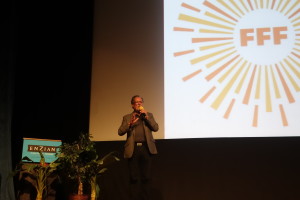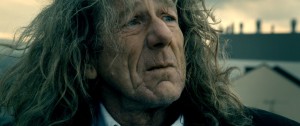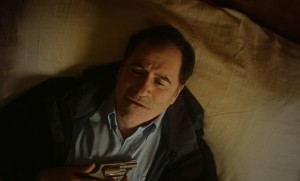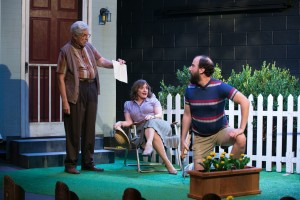Florida Film Festival 2016
Sissy Spacek, Mark Duplass to headline
Highlights & reviews from the 25th festival
From The Orlando Weekly and MeierMovies.com
Oscar winner Sissy Spacek will headline the 25th Florida Film Festival next month, appearing at a special screening of Badlands (1973) on April 15 and participating in a Q&A session. The Terrence Malick film will be one of 54 feature films at the 10-day festival, which will run April 8-17.
In addition to Spacek, the festival will welcome the multi-talented Mark Duplass, who is credited with helping start the mumblecore movement. He will attend a screening of The Puffy Chair (2005), which he wrote, co-directed and starred in, on April 10 and participate in a Q&A.
The festival will again be held at the Enzian Theater in Maitland and Regal Cinemas in Winter Park Village. Enzian Forever, the plan to add two screens to the Enzian, will not affect this year’s festival, as groundbreaking is not expected until later summer or early fall, pending approval by the City of Maitland.
The event will screen 180 movies (54 features and 126 shorts). That’s more than ever before and up slightly from the 177 films (57 features and 120 shorts) last year. The lineup was revealed tonight at the Program Announcement Party at Enzian.
The opening-night movie will be The Lobster, a dystopian, absurdist film that became one of the darlings of the festival circuit in 2015 but has not yet received even a limited release, making it highly sought after by fans of art-house cinema.
The feature categories look much the same as in previous years. The festival will offer 12 Spotlight Films, 10 movies in the Narrative Features competition, 10 in the Documentary Features competition, four International Showcase Features, four Midnight Features, three Family Films, two Food Films, three Music Films and two Florida Documentaries.
One of the two Florida doc features (Memories of a Penitent Heart) and the short that precedes it (Pink Boy) address LGBT themes. And the second, Wrestling Alligators, is directed by Andrew Shea, whom Enzian patrons might remember as the director of Portrait of Wally, which played the Central Florida Jewish Film Festival in 2012.
Retro films include Don Chaffey’s One Million Years B.C. (1966), which will be presented free of charge in Winter Park’s Central Park, and Mike Nichols’ Who’s Afraid of Virginia Woolf?, which will close the festival. (Both movies are celebrating their 50th anniversary.) No outdoor films are planned at Enzian, as the “Pitcher Shows” on the lawn have been discontinued temporarily.
Continuing the tradition of naming the narrative-shorts blocks for songs by musicians who have recently died, the festival will present “Let’s Deutsche: New German Shorts” in honor of David Bowie’s “Let’s Dance.” But the tribute doesn’t stop there, as four other narrative-shorts blocks are named for Bowie compositions: “Changes,” “Ashes to Ashes,” “Young Americans” and “Modern Love.” Also, the Documentary Shorts block is called “Where Are We Now.”
The rest of the shorts blocks are similar to previous years’. There are Animated Shorts, International Shorts, International Animated Shorts and Florida Shorts: Best of Brouhaha. Last but not least, the festival will again offer – to quote former Republican presidential candidate Lindsey Graham – “bat-shit crazy” Midnight Shorts.
 Thirty-six countries are represented. In addition, 24 films are making their world premieres, with 114 others getting either their U.S., regional or Florida premieres.
Thirty-six countries are represented. In addition, 24 films are making their world premieres, with 114 others getting either their U.S., regional or Florida premieres.
The event is one of fewer than 100 Oscar-accredited festivals in the world, meaning the Grand Jury winners of the live-action shorts, animated-shorts and documentary-shorts categories will be eligible for an Academy Award.
“I just love the diversity and filmmaking talent that will be on display in this year’s lineup,” says Programming Director Matthew Curtis. “With the most films we’ve ever programmed in one [festival], the most countries ever represented, the most female filmmakers (59), and an exciting mix of new voices and 35 [festival] alumni returning with outstanding new work, this promises to be a truly banner year.”
The festival will also offer four forums, including “Perseverance: Sisters Are Doing It for Themselves” on April 13 and “An Introduction to Cinematography” on April 14. And, as always, there will be parties and special events, including the Opening Night celebration on April 8, the Awards Bash on April 16 and a farmers market on April 10.
Tickets to individual films go on sale March 18 and cost $11 for a movie after 5 p.m. and $9 for a movie at 5 p.m. or earlier. Ticket packages are available now and range from Cinematic Sampler (five films for $50) to Film Buff (10 for $95) to Aficionado (20 for $180), and all the way up to the Producer pass, which costs $1,500 and gives you priority access to everything.
For the full schedule and additional information, visit www.floridafilmfestival.com. And stay tuned to The Orlando Weekly for full event coverage and reviews of the films.
Film Reviews
From The Orlando Weekly, April 6, 2016
Before delving into the features, which are organized below from best to worst, let’s examine some of the shorts. The shorts were already my favorite part of the festival, but now there’s a reason to respect them even more: The Florida Film Festival is Oscar-accredited in all three major shorts categories (live action, animated and documentary) for the first time. Fewer than 20 festivals worldwide have accreditation in all three, and no other Florida festival has any type of Academy accreditation.
Program #2 (“Ashes to Ashes”) is a must-see, a mind-expanding, consequential program that’s among the best the festival has ever offered. (It’s also for adults only, as it contains graphic violence and simulated oral sex.) And, befitting the David Bowie-inspired title, alternating threads of death (or some other life-changing event) and absurdism run through every short.
That doesn’t mean all eight of its films are winners. For instance, Other People’s People thinks it’s a feature, introducing more characters and plots than it can handle; Los Niños Sicarios struggles to convey its message; and Savasana – well, you’ll just have to decide for yourself whether its brand of absurdism is for you. All three deserve 2 stars (on our 0-5 scale).
The other five selections prove just how powerful short film can be. Florence (3 stars) is a horror about the dangers of overmedication and wrongful diagnoses, while Tail (3 stars) is a charming and unique examination of a physically challenged nerd’s quest for love. Absurdism tinges Tail but goes full tilt in My Last Film (4 stars), a cleverly meta-theatrical examination of film itself.
The program saves the best for last. Black Swell (4 stars), starring the incomparable Richard Kind, again looks at death, but in a moralistic, almost poetic way, while Thunder Road (4 stars), which won the Grand Jury prize at the Sundance Film Festival, teaches that grief comes in all forms, even ridiculous ones, thanks to a terrific performance by writer-director Jim Cummings.
The documentary shorts (6 x Real: “Where Are We Now?”) are just as good. The Tricks List and Traffic Stop (both 2 stars) don’t reach their full potential, but the other four are stellar. And though The Trials of Constance Baker Motley and The 100 Years Show (both 4 stars) are top-notch, my favorite is I Am Yup’ik (5 stars), a stunningly human look at how basketball unites a tiny Alaskan community. It’s the Hoop Dreams of short films.
Shorts program #1 (“Changes”) isn’t as memorable as either program #2 (“Ashes to Ashes”) or the documentary shorts (6 x Real: “Where Are We Now?”), but about half its films are worth viewing.
Most impressive is Zelos (4 stars), which takes the familiar sci-fi subject of clones and turns it on its ear. The Seamstress (3 stars), about an aging Chinese woman struggling with work and family, is also solid. More challenging thematically and stylistically is Peacock Killer (3 stars), which addresses man’s strange habit of tackling his guilt by taking revenge on things that never harmed him.
Stylistically different but no less dramatically impactful is Verbatim: The Ferguson Case (3 stars), which presents, in reenactment form, the word-for-word testimony of the police officer and a witness is the 2014 shooting in Ferguson, Missouri. And for a lighter, but no less enjoyable, touch, there’s Sundae (also 3 stars), about a mom on a very serious mission that may or may not end up in ice cream. (Shorts #1 plays for the final time on April 12, at 7 p.m., at Regal Winter Park Village.)
The least enjoyable shorts program, at least for my taste, is #4 (“Modern Love”), which lives up to its name and then some, as many of the eight films contain graphic discussions and depictions of sex. One even contains a brief clip of real intercourse. So please heed the festival’s warning that the program is for adults only.
Though the program is for an 18-and-over crowd, I hesitate to say it’s for a mature one, as a couple of films would be better suited to the Midnight Shorts program. Instead of challenging us aesthetically or emotionally, most of the shorts instead exist only to shock or insult our intelligence. Even worse, they think they are something greater, a noble attempt at honesty or avant-garde cinema, when they really are just one step above pornography (albeit really well-shot porn).
Profoundly annoying is Bad at Dancing (0 stars), which seems to be making a statement about beauty, friendship, jealousy and societal conventions regarding personal space, but stumbles badly on its tedious cinematic mini-odyssey. Especially grating is its use of the song “Red River Valley.” Not even the cowboy who loved you so true could love this film.
With that admittedly harsh criticism out of the way, I must confess that the festival programmers succeed on one level: They make the experience profoundly uncomfortable, especially when we are forced to listen to our fellow audience members laugh nervously and fidget, while other viewers walk out.
As disappointing as most of the selections are, two deserve praise. Too Legit (3 stars) is a clever though clunky commentary on rape, while Dinner with Family with Brett Gelman and Brett Gelman’s Family (4 stars) is one of the best shorts of the entire festival. Tackling just about every nightmarishly dysfunctional family issue you can think of – and framing those issues in a breathtakingly twisty and metatheatrical way – the film, directed by Jason Woliner and starring Patti LuPone and Tony Roberts, is exactly what the rest of this program wanted to be: provocative, uncomfortable, funny and boundary-pushing.
If you’re brave, horny or simply don’t trust my recommendations (you wouldn’t be the first), the program plays for the final time on April 14 at 9 p.m., at Regal Cinemas Winter Park Village 20.
Even nuttier is the Midnight Shorts program, which I usually avoid. Often the realm of gross-out comedies and batshit-crazy horror, the shorts this year were something far greater: the best Midnight program I’ve ever seen. Although the block has its fair share of adolescent silliness, it carries real weight, with The Past Inside the Present (4 stars) being one of the best shorts of the entire festival. Also worthy of a watch were the oddly hilarious The Procedure, the mesmerizing Manoman and the nightmarish Fuckkkyouuu, all getting 3 stars. (Yes, I’m really giving a thumbs-up to a film with that latter title.) There were a few zero- and one-star flicks, but there were also a couple of near-misses that held some crazy charm, such as Carnal Orient, Puppet Man and Double Blind No. 1, all three getting 2 stars.
Among the other shorts programs, Pickle (4 stars) is a stand-out. Directed by Amy Nicholson and preceding Newman, the short doc is devoted to animals who need a little help to survive – who are in, well, a pickle. The film – in a both touching and quirky fashion, complete with animation – depicts the love of one married couple for a paraplegic possum, a fish that can’t swim, a cat with a heart defect and countless other creatures who, like ourselves, enjoy our brief moment in the circle of life.
If you’re into potty humor, there’s Killer (3 stars, from Shorts Program #3: “Young Americans”) – perhaps the best short film ever about masturbation – and, from the animated program, T.P. (3 stars), about actual potties. Also from the animated block is The Loneliest Stoplight (3 stars). Animated by Bill Plympton and narrated by Patton Oswalt, the film, which some might remember from this year’s Oscar Shorts program, is simple and not as edgy as Plympton’s usual fare, but it has more than its share of heart.
From the “Let’s Deutsch: New German Shorts” program, there’s 90 Grad Nord (90 Degrees North) (2 stars), the story of two men trapped at a pedestrian crosswalk that is perpetually red. Though the film by Detsky Graffam is well conceived and impeccably shot, it is both too long and tonally challenged, unable to successfully balance its absurdist social metaphor with its penchant for comedy-horror. Even more disappointingly, the editing fails to invoke the sense of panic that the men should feel, while the screenplay has more in common with Rubber than with, say, the Spanish-language absurdist films The Phone Box and The Exterminating Angel, to which it aspires.
As good as many of the aforementioned films are, nothing can prepare you for another selection from the “Let’s Deutsch” program: Till Nowak’s Dissonance (5 stars), a jaw-dropping blend of animation and live action that is pure cinematic genius. It’s not just the best new film of the festival (features included) – it’s the best short I’ve ever seen.
“You cannot talk about art,” says Carmen Herrera, the subject of The 100 Years Show. “You have to art about art.” With that in mind, I’m done talking. Now go see these films.
Features (from best to worst)
From The Orlando Weekly, April 6, 2016
and The Orlando Weekly, April 8, 2016
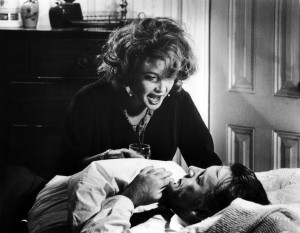 Who’s Afraid of Virginia Woolf? (4 ¾ stars) is the best – and the most emotionally wrenching – feature of the festival. The 1966 classic from Mike Nichols stars Elizabeth Taylor, Richard Burton, George Segal and Sandy Dennis.
Who’s Afraid of Virginia Woolf? (4 ¾ stars) is the best – and the most emotionally wrenching – feature of the festival. The 1966 classic from Mike Nichols stars Elizabeth Taylor, Richard Burton, George Segal and Sandy Dennis.
Based on Edward Albee’s play, the film was nominated for 13 Academy Awards, receiving a nod in every category for which it was eligible. It won five. Yet it’s not the Oscars it’s remembered for – it’s the uncomfortably claustrophobic, even absurdist, way in which the dark comedy/drama exposes the underbelly of a marriage rife with alcoholism, jealousy and bitterness.
Buy your ticket for this Closing Night Retro film (April 17, 9:30 p.m., Enzian) now, and don’t forget to order a stiff drink at Eden Bar beforehand. You’ll need it.
Yorgos Lanthimos’s The Lobster (4 stars), which is this year’s Opening Night film, is a modern absurdist classic and arguably the best new narrative feature of the festival. The bad news: It’s playing only once, on April 8. The good news: It will soon be in wide release.
If American TV sitcoms were Mount Olympus, Norman Lear would be Zeus. Described as the most influential producer in tube history, Lear started as a writer at the dawn of the industry and went on to mastermind such shows as Sanford and Son, Good Times, Maude, The Jeffersons and his masterpiece, All in the Family, which brought the social revolution of 1960s cinema to 1970s television.
“Comedy was our business,” Lear says. “But we had something on our minds.”
The 90-year-old icon deserves not just another talking-heads documentary but something substantial, and he certainly gets it in Norman Lear: Just Another Version of You (4 stars), which, under the direction of Heidi Ewing and Rachel Grady (Jesus Camp), explores – with stylistic and narrative richness – the works of the producer and the inner workings of the man.
“You can’t go home again,” Thomas Wolfe wrote. The subjects of The Babushkas of Chernobyl (3 ¾ stars), the fascinating documentary by first-time directors Anne Bogart and Holly Morris, would disagree.
 When the Chernobyl Nuclear Power Plant disaster occurred in 1986, more than 100,000 people were evacuated from a thousand-square-mile area that became known as the Exclusion Zone. Most never returned to their ancestral homes. But a stubborn group violated the law and snuck back. Roughly 100 people – mostly old women – remain, and the law has essentially turned a blind eye to them, allowing them to live, semi-legally, in virtual isolation, unprotected from the radiation that still permeates the ground, the trees, the food and themselves.
When the Chernobyl Nuclear Power Plant disaster occurred in 1986, more than 100,000 people were evacuated from a thousand-square-mile area that became known as the Exclusion Zone. Most never returned to their ancestral homes. But a stubborn group violated the law and snuck back. Roughly 100 people – mostly old women – remain, and the law has essentially turned a blind eye to them, allowing them to live, semi-legally, in virtual isolation, unprotected from the radiation that still permeates the ground, the trees, the food and themselves.
Yet this is not a tale of law-breakers. This is story of survival and defiance, and the meaning of happiness. Indeed, remarkably, statistics show that the women who came back and exposed themselves to years of radiation have lived longer than the women who never returned. Radiation, it seems, is less damaging than heartbreak and exile. And the documentary, which is receiving its Florida premiere, presents – in a simple, straightforward style – a remarkable historical document while also illustrating an essential truth about human existence: “You don’t get sick in your Motherland.”
The feature is preceded by a short doc, The House is Innocent (3 stars), directed by Nicholas Coles, about Tom and Barbara, a couple living in a house in Sacramento, Calif., that had been the scene of grisly murders. But instead of fighting the home’s reputation, they embrace it.
“It’s like creepy in a good way,” Tom says.
Lacking the profundity of the feature it accompanies – and running a tad too long – the short is still a fun watch and, like The Babushkas, teaches that a positive attitude and a purpose in life are more important than your damaged surroundings.
Hooligan Sparrow (3 ¾ stars) is that rare accomplishment documentary filmmakers dream of but rarely get: an as-it-happens, in-your-face exposé. Director Nanfu Wang followed human-rights activist followed Ye Haiyan (a.k.a. Sparrow) for many months to capture this troubling look at the Chinese government’s habit of surveillance, harassment and imprisonment, specifically as it relates to the sex trade and oppression of young women. Shot mostly with a shaky camera, lacking a solid structure and containing a less-than-stellar voiceover narration, the doc is still one of the most memorable of the festival because of its revelatory journalism.
“You can kill me, but you can’t kill the truth,” Sparrow says. Unfortunately, you can kill the truth, especially if you’re the Chinese government. But you can’t kill film.
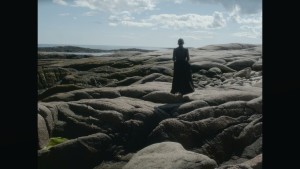 To Keep the Light (3 ¼ stars), by first-time writer-director Erica Fae, is a quietly mesmerizing look at the lonely life of a lighthouse keeper’s wife who is struggling with her daily duties – and her sanity – while caring for her sick husband in 19th-century Maine. When a mysterious stranger washes up on shore, she is forced to confront both her past and future.
To Keep the Light (3 ¼ stars), by first-time writer-director Erica Fae, is a quietly mesmerizing look at the lonely life of a lighthouse keeper’s wife who is struggling with her daily duties – and her sanity – while caring for her sick husband in 19th-century Maine. When a mysterious stranger washes up on shore, she is forced to confront both her past and future.
Shot much like a haunted-house thriller, the film takes on an Ingmar Bergman feel in the second half. Though it offers few surprises once its twist is revealed, its beauty and confidently methodical pacing – not to mention a solid performance by Fae herself – make it one of the better offerings in the Narrative Features competition. It doesn’t utilize the rich Downeast New England dialect as much as it could, but it nevertheless captures the feel of the period and, in keeping with many other films at the festival, features an interesting feminist theme.
Sissy Spacek will be making a special appearance at a screening of Terrence Malick’s Badlands (3 stars), and participate in a A&A after the film. Though the 1973 classic isn’t the director’s best, you’d be unwise to waste a chance to see the visual master’s work on the Enzian big screen. Get your tickets now for the April 15 showing.
Everything is not what it seems in Donald Cried (3 stars), a seemingly slight and innocuous comedy that, if given time, becomes something deeper. In fact, if you make it through the pedestrian dialogue and handheld camera of the first 30 minutes, you will slowly discover one of the nicest surprises of the festival.
Peter (Jesse Wakeman) has returned to his hometown to wrap up the affairs of his recently deceased grandmother, but after losing his wallet, he must seek help from his mentally challenged but well-intentioned childhood friend, Donald (Kris Avedisian, who also writes and directs). Thus begins an odd journey of rediscovered friendship that is as revelatory for the two men as it is for the audience, thanks to great chemistry between the actors and an odd but ultimately successful balance between stoner comedy and dramatic realism.
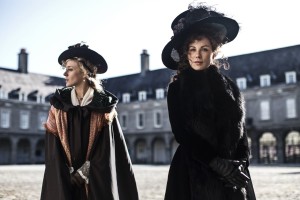 Love & Friendship (3 stars), set in England in the 1790s and based on Jane Austen’s Lady Susan, is among the most highly anticipated of the “Spotlight” films. Directed by Whit Stillman, this is the saucy and amusing, if slight, tale of a widow (Kate Beckinsale) who is but one step removed from a Covent Garden nun and twice as conniving in her quest to secure wealthy husbands for both herself and her daughter. Indeed, she’s not above random giblet joining if it both tickles her fancy and helps wrest her future from destitution.
Love & Friendship (3 stars), set in England in the 1790s and based on Jane Austen’s Lady Susan, is among the most highly anticipated of the “Spotlight” films. Directed by Whit Stillman, this is the saucy and amusing, if slight, tale of a widow (Kate Beckinsale) who is but one step removed from a Covent Garden nun and twice as conniving in her quest to secure wealthy husbands for both herself and her daughter. Indeed, she’s not above random giblet joining if it both tickles her fancy and helps wrest her future from destitution.
Conveying a lively understanding of the plot is unnecessary here, as comprehension of the particulars is pointless. This is style over substance, but what fun the style! Particularly enjoyable is the hilarious Tom Bennett as Jane’s pudding-headed Jerry sneak.
If you missed this period comedy ereyesterday, you regrettably won’t be able to view said magic lantern show overmorrow either, as it is making just one appearance at the faire. But look for it in general release within a pair of fortnights.
You can put away your 18th-century dictionaries now, as the rest of my reviews embrace modernity (awesome, modern, kick-ass shit).
World Nibbler champion Tim McVey (no, not Timothy McVeigh) is tired of getting asked about his favorite video game.
“What’s Nibbler? What’s Nibbler? What’s Nibbler? God, I’m sick of that question,” he says.
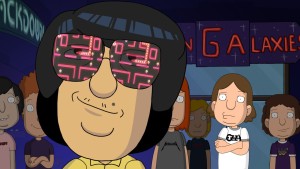 After watching the documentary Man vs. Snake: The Long and Twisted Tale of Nibbler (2 ¾ stars), you’ll definitely know what Nibbler is. However, you might be sick of the game itself. But despite the fact that the doc almost collapses in tedium toward the end, it has enough kooky charm to sustain itself.
After watching the documentary Man vs. Snake: The Long and Twisted Tale of Nibbler (2 ¾ stars), you’ll definitely know what Nibbler is. However, you might be sick of the game itself. But despite the fact that the doc almost collapses in tedium toward the end, it has enough kooky charm to sustain itself.
Directed by Tim Kinzy and Andrew Seklir, this is the unlikely story of how one nerdy teen (McVey) became the first person to score a billion points on a video game (in 1984) and then attempted to reclaim his record once it was eclipsed by fellow gaming geeks.
“A billion-point game can give you carpal tunnel syndrome,” we’re told. And that’s easy to believe, as the achievement takes about 40 hours of nearly non-stop gaming. Yet reaching that 10-digit score means the world to McVey and his man-boy buddies, and the doc quirkily captures their passion. It doesn’t quite achieve the beautiful lunacy of The King of Kong: A Fistful of Quarters, to which it owes much, but it does project a sort of awkward, yet strangely touching humanity that’s easy to admire.
It’s preceded by Live Fast, Draw Yung (2 stars), a short doc about Yung Lenox, a 6-year-old boy who uses marker and paper to re-create covers of rap albums. The film is shot and paced well and difficult to resist on a purely cinematic level. It is also strangely inspirational if viewed in a certain light. But it emits an unsettling aftertaste because of its refusal to delve deeply into the moral questions raised by a youth’s exposure to adult material and a father’s penchant for promotion.
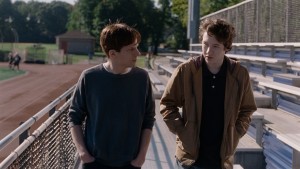 Louder than Bombs (2 ¾ stars), another Spotlight film, may not live up to its lofty expectations for some moviegoers, thanks to its methodical pacing, non-linear structure and almost experimental use of voiceover narration. But if you’re in the right mood, you may come to embrace its Ordinary People feel.
Louder than Bombs (2 ¾ stars), another Spotlight film, may not live up to its lofty expectations for some moviegoers, thanks to its methodical pacing, non-linear structure and almost experimental use of voiceover narration. But if you’re in the right mood, you may come to embrace its Ordinary People feel.
Directed and co-written by Joachim Trier (distant relation of Lars von Trier) in his English-language debut, the film portrays a father (Gabriel Byrne in one of his strongest performances) and his two sons (Jesse Eisenberg and Devin Druid) struggling to communicate with one another following a family tragedy.
Calm and bloodless almost to a fault, the story feels like it’s both nothing and everything simultaneously, as if the characters are walking through life shell-shocked. That numbness – especially when combined with the screenplay’s time jumps – robs the film of forward momentum and energy, but the film’s originality and maturity end up shining through. Louder ultimately succeeds because it has the courage to be quieter.
Wrestling Alligators (2 ¾ stars) — not reviewed
The Jazz Loft, According to W. Eugene Smith (2 ¾ stars) merges photography and jazz music, alternating between the two topics in the free-form style of the latter. Specifically, the documentary tells the tale of a famous jazz loft on Sixth Avenue in New York City in the late 1950s and early 1960s, and the astonishingly vast collection of photographs and audio recordings made by famous journalistic shutterbug W. Eugene Smith.
Blending in with musicians such as Thelonious Monk and Zoot Sims, Smith seemed right at home. “He was playing his camera,” we’re told, riffing not with a musical instrument but with lenses, F-stops, fixer and bleach.
The doc is interesting and entertaining when it explores Smith’s unique personality but, as does a jazz riff, tends to wander, especially when dwelling on the loft’s musicians. And if you’re not into the topics, it’s a bit of a snoozer. But it’s still worth a look, if only for educational purposes.
Regrettably, the feature is accompanied by Chekhov (0 stars), a self-indulgent short doc with absolutely no raison d’etre.
One of the festival’s four International Showcase features, Lamb (2 ¼ stars) is an Ethiopian film (in Amharic, with English subtitles) about a boy’s stubborn independence, perseverance and love for his pet sheep. Written and directed by first-timer Yared Zeleke, the film was Ethiopia’s Oscar submission for foreign-language film. (It was not nominated.)
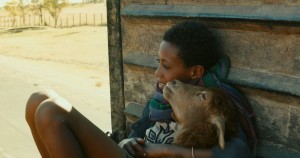 Following the death of his mother, young Ephraim (Rediat Amare) and his father leave their native village in search of a better life. “I don’t want to leave either,” his father tells him, “but if we stay, we may meet your mother’s fate.”
Following the death of his mother, young Ephraim (Rediat Amare) and his father leave their native village in search of a better life. “I don’t want to leave either,” his father tells him, “but if we stay, we may meet your mother’s fate.”
Realizing that success can come only in the big city, the boy’s father leaves Ephraim with unsympathetic relatives – in rural isolation – while he seeks work in Addis Ababa. The separation devastates the boy, and he clings to the one thing that gives him comfort and reminds him of home: Chuni, his lamb. But, predictably, the relatives don’t view the animal as a pet.
“You’re going to learn what all boys must do in our country: sacrifice sheep,” his uncle scolds him.
Lamb is not the maudlin tearjerker it might have been. In fact, it’s surprisingly devoid of passion. That imbues it with a realistic maturity, especially considering its refreshing inclusion of complex female characters and beautiful landscapes. (Who knew Ethiopia was so breathtaking?) But it also makes the film a tough watch thanks to its almost unbearable pacing and lack of emotional impact. Frankly, this review could have gone either way. If Ethiopian culture and the film’s premise interest you, you might give it a try, but this reviewer simply never got enough from the actors or the story arc to merit a recommendation, especially given the weak ending.
 In Hunky Dory (1 ¾ stars), Sidney (Tomas Pais) is a down-on-his-luck drag queen struggling to care for his 11-year-old son after the boy’s mother disappears. He must balance parenting with his daily dose of turning up on friends’ doorsteps to coo for cash and cock.
In Hunky Dory (1 ¾ stars), Sidney (Tomas Pais) is a down-on-his-luck drag queen struggling to care for his 11-year-old son after the boy’s mother disappears. He must balance parenting with his daily dose of turning up on friends’ doorsteps to coo for cash and cock.
Directed by Michael Curtis Johnson and getting its Florida premiere, Hunky has a solid premise, a comparatively strong ending and good chemistry between Pais and Edouard Holdener, who is excellent as Sidney’s son. But it never achieves its desired emotional impact thanks to ill-conceived (and poorly portrayed) supporting characters, a script stretched too thin, a rambling structure and the feeling that we’ve seen similar stories before, just told with more finesse.
Director-producer-writer-actor Mark Duplass will attend the festival to screen The Puffy Chair (1 ½ stars) on April 10 at 7 p.m., at the Enzian Theater, and participate in a Q&A session. A ticket costs $25. (Buy yours now, as the event will likely sell out.)
The 2005 film is a road-trip disaster in which Josh (Duplass), his girlfriend (Katie Aselton) and his hippie brother (Rhett Wilkins) travel hundreds of miles to purchase a vintage “puffy” reclining chair for Josh’s dad’s birthday.
In keeping with the spirit of the festival – and the many talents of Duplass – I wish had more good things to say about the film, which he produced, wrote and co-directed (uncredited) with his brother, Jay. It’s admittedly a seminal event in mumblecore cinema and captures, albeit sporadically, that improvisational, naturalistic feel of the genre, complete with the home-video look. But apart from a few charming and funny moments, it has almost nothing profound or interesting to say about life, relationships or family: the very subjects it’s addressing.
Indeed, its supposedly hyper-realistic feel is ruined by plot elements that stretch credibility to the breaking point. And when those story flaws are combined with characters that are mostly annoying and unlikeable (though competently acted) – and camerawork by what appears to be a monkey with an iPhone – Chair ends up flat rather than puffy.
(For a better Duplass film, see The One I Love, from 2014. He was only in front of the camera on that one, but it still offers a better demonstration of his talents.)
Mad (1 ½ stars) wants to be a John Cassavetes film so badly it can taste it. Instead, it’s mostly an exhausting, annoying experience thanks to its interminable pacing, haphazard editing and rambling structure. And the performances, though competent, can’t make up for the feeling that Robert Putka’s debut feature is more a series of vignettes than a complete film.
Melanie (Maryann Plunkett), who has just undergone a tough divorce and a nervous breakdown, is always at odds with her daughters, who are constantly at each other’s throat. This is not a happy family, with each member seemingly madder (in both senses of the word) than the next.
Putka does infuse the film with some comedy, and a subplot involving another hospital patient (Mark Reeb) is intriguing, but, like most other elements, it goes nowhere. Especially underdeveloped and confusing is another subplot with the elder daughter (Jennifer Lafleur), who is forced to confront legal problems while arguing with her sister (Eilis Cahill) and dealing with her bi-polar mom.
“Your mother suffered a nervous breakdown,” a nurse tells one of the daughters. “She’s really good at crying.”
That’s certainly true, but crying is not enough to make an emotionally fulfilling film, even when accompanied by a healthy heaping of bitching and complaining.
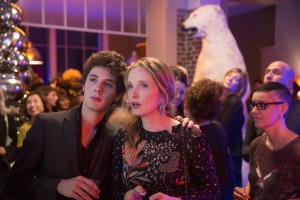 Lolo (1 ½ stars) is a French farce, with a dab of darkness. Julie Delpy, who also directs and co-writes, plays Violette, a 40-something overbearing mother (with an even more overbearing son) struggling to find romance. Embracing relationship comedy and silly slapstick, the film features a deliciously creepy premise and somewhat competent performances but fails to produce intelligent laughs thanks to its ridiculous plot, uninspired writing, overbearing score and an almost total lack of comic timing.
Lolo (1 ½ stars) is a French farce, with a dab of darkness. Julie Delpy, who also directs and co-writes, plays Violette, a 40-something overbearing mother (with an even more overbearing son) struggling to find romance. Embracing relationship comedy and silly slapstick, the film features a deliciously creepy premise and somewhat competent performances but fails to produce intelligent laughs thanks to its ridiculous plot, uninspired writing, overbearing score and an almost total lack of comic timing.
Lolo (Violette’s 19-year-old son, played by Vincent Lacoste) strongly objects when his mom invites her new boyfriend (Dany Boon) to live with them. “We’re not going to play blended family like some dumb American comedy,” he says.
Instead, we get a dumb French comedy.
One of the most highly anticipated festival films, Hunt for the Wilderpeople (1 ¼ stars) is written and directed by Taika Waititi (What We Do in the Shadows and Boy). But despite an interesting premise and the charismatic Sam Neill as co-lead, the film is an embarrassingly unfunny, badly written and tonally challenged mess.
Neill, as a backwoods curmudgeon, preposterously finds himself on the run from the law with his 13-year-old adopted son, played by Julian Dennison, in a Rebel Wilson-like contrived performance gone badly wrong. Throw in a couple of other cringe-worthy actors, unneeded musical interludes, 10 (yes, 10) pretentious chapter headers, lots of aren’t-you-impressed helicopter/drone shots and a failed attempt at sweetness toward the end, and you have an unexpected misfire from the up-and-coming New Zealand filmmaker.
In Search of the Ultra-Sex (1 star) is a 60-minute mash-up of old porn-movie clips, with the explicit parts removed and new French-language dialogue (with English subtitles) added, in the style of Mystery Science Theater 3000 or Woody Allen’s What’s Up, Tiger Lily? Unfortunately, the film is neither as clever nor funny as those aforementioned classics. But it’s still an enjoyable romp on a certain level – especially if you’re drunk and it’s close to midnight (which is the only time this movie is playing the festival). And despite its tedium and surprisingly limp jokes (no pun intended), there’d have to be something slightly wrong with you to completely hate this film. And I hope the filmmakers wear this 1-star rating with a sense of pride for a job well done. Or, just done.
Lastly, let’s take a brief look at two of the most highly anticipated films I didn’t get a chance to see. I’m thinking specifically of the “Spotlight” films. No, these movies aren’t tributes to last year’s Oscar-winning best picture. The name is simply a way of shining a light on movies that have already received distribution deals and, with a few exceptions, are not competing for awards. That distribution status makes the films notoriously difficult to screen in advance. Though it might be wise to keep all on your planning radar, three (that I didn’t get a chance to see) deserve special mention.
High-Rise, directed by Ben Wheatley, is a British science-fiction thriller set in the 1970s. It stars Tom Hiddleston, Jeremy Irons, Sienna Miller and Elizabeth Moss, and, at least based on those names and the trailer, looks irresistible. And who can resist Werner Herzog? OK, well a lot of sane people, actually. But that still doesn’t mean you should miss his latest project, Lo and Behold, Reveries of the Connected World.
Epilogue
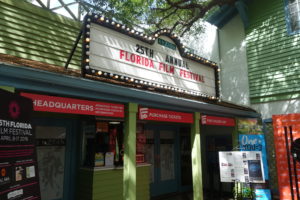 From The Orlando Weekly, April 17, 2016
From The Orlando Weekly, April 17, 2016
The 25th annual Florida Film Festival presented its awards Saturday night at the Enzian Theater in Maitland, with The Other Kids taking home the Grand Jury Award for best narrative feature and Honey Buddies picking up the audience award.
Left on Purpose won the Grand Jury Award for best documentary feature while the audience picked The Babushkas of Chernobyl.
The documentary Best and Most Beautiful Things was awarded a “special jury award for individuality of the human spirit,” and the narrative Donald Cried was recognized for “excellence in directing.”
Red Folder won the Grand Jury Award for best narrative short while The House is Innocent won the audience award for best overall short. The Grand Jury Award for best documentary short went to Pickle, and The Lingerie Show won the Grand Jury Award for best animated short.
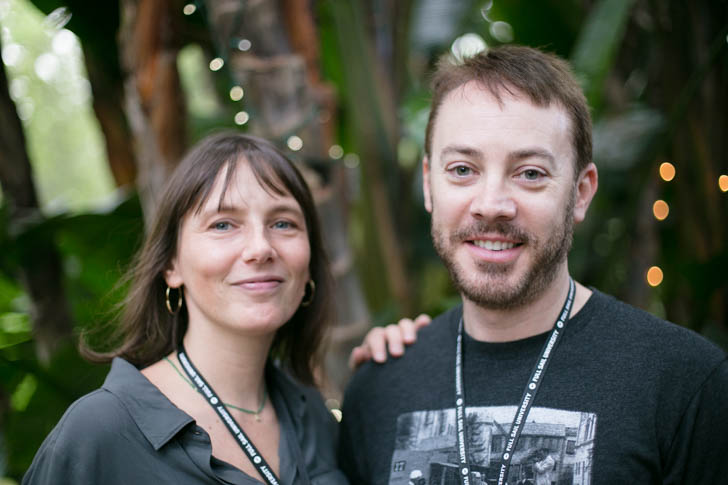
Erica Fae (the director, writer and star of “To Keep the Light”) and Cameron at festival’s awards bash
The festival is one of just 19 in the world to be Oscar-accredited in the three short-film categories (live-action, animation and documentary), so Red Folder, Pickle and The Lingerie Show may now be considered for Academy Award nominations.
Too Legit won a special jury prize for “achievement in satire” while the audience selected Portal to Hell!!! as their favorite Midnight short. This was the inaugural year for the latter award.
Some of the films shown at the festival screened out of competition. For instance, American Spotlight features were eligible for neither jury nor audience awards, while international Spotlight features and international shorts were eligible for just audience awards.
The ceremony was hosted by the Enzian’s Shea Suzer. The festival wraps up on Sunday night with the closing-night “retro” film, Who’s Afraid of Virginia Woolf? See www.floridafilmfestival.com for more information.
© 2016 Orlando Weekly / MeierMovies, LLC


